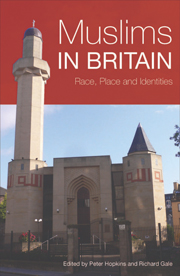Book contents
- Frontmatter
- Contents
- Acknowledgements
- List of contributors
- List of tables
- List of figures
- 1 Introduction: Muslims in Britain – race, place and the spatiality of identities
- Section 1 Gender, place and culture
- Section 2 Landscapes, communities and networks
- Section 3 Religion, race and difference
- Afterword
- Index
1 - Introduction: Muslims in Britain – race, place and the spatiality of identities
Published online by Cambridge University Press: 05 August 2013
- Frontmatter
- Contents
- Acknowledgements
- List of contributors
- List of tables
- List of figures
- 1 Introduction: Muslims in Britain – race, place and the spatiality of identities
- Section 1 Gender, place and culture
- Section 2 Landscapes, communities and networks
- Section 3 Religion, race and difference
- Afterword
- Index
Summary
Introduction – British Muslim identities and the politics of writing
Researching and writing on Islam and Muslim identities has become an unavoidably political enterprise. Superficially of course, this observation is (or should be) nothing more than a professional commonplace – all research processes are inherently political, as any reflexive researcher knows. Skewed relations of power between researcher and researched are a constant of most social research situations, further complicated by cross-cutting considerations such as whether the researcher is an insider or outsider of the research participants' social network, and whether or not there are gendered, generational, ethnic or class differences – most often a combination of some or all of these – which need to be sensitively negotiated in research encounters. Moreover, these considerations do not simply evaporate on the completion of fieldwork, but carry over into the writing process, taking on new dynamics as existing codes and conventions of writing are adapted to the task of articulating particular (read selected) cultural representations. This is the salutary lesson taught by James Clifford and George Marcus in their seminal work, Writing Culture (1986). Indeed, as Clifford remarks in his introduction to the book ‘[social] science is in, not above, historical and linguistic processes’, to the extent that ‘the poetic and the political are inseparable’ in ethnographic and other scientific writing (Clifford 1986: 2).
- Type
- Chapter
- Information
- Muslims in BritainRace, Place and Identities, pp. 1 - 20Publisher: Edinburgh University PressPrint publication year: 2009



